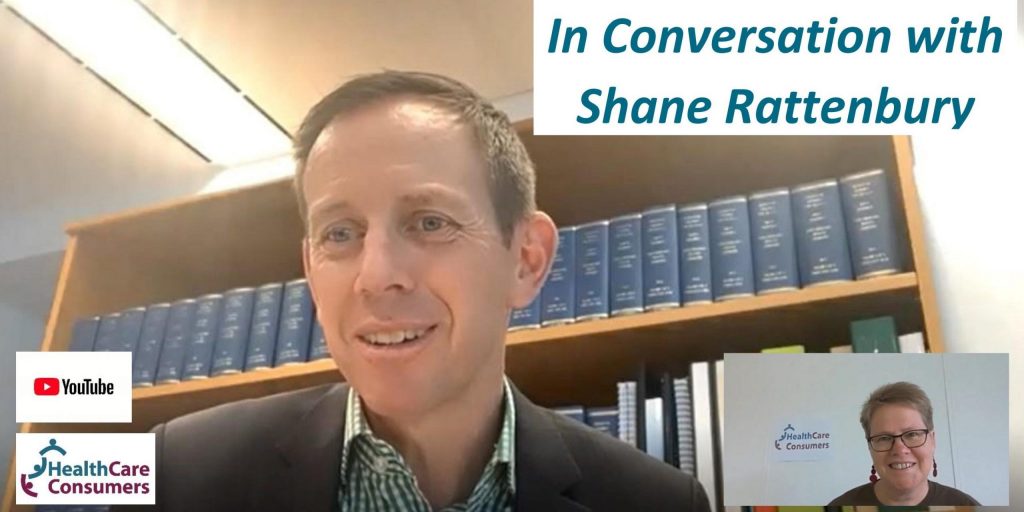Publications
ACT Election 2020: In Conversation with Shane Rattenbury MLA (ACT Greens)
2 October 2020

In September HCCA held a series of online (Zoom) events – In Conversation with Candidates. We spoke with the health spokespeople of each of the main parties about their vision for our local health system and response to the priorities HCCA has identified.
The second In Conversation event was with Shane Rattenbury MLA, ACT Greens, if you missed it you can watch the full recording here or below.
In his opening remarks Minister Rattenbury highlighted the importance of addressing the complex social determinants of health (at 7:01) through the increase spending on things like social and community housing (at 8:07). He also highlighted the Greens’ focus in delivering preventative health care services to reduce the load on the acute system, as well as improving the primary care co-ordination for those with chronic conditions (at 7:19).
The Minister talked at length on the need to improve the range of models available in the mental health sector (at 9:12 and 42:17), highlighting the range of approaches and services that are being funded to help support an early intervention model, including increased investment in supported accommodation, the Police, Ambulance and Clinician Early Response (PACER) program, the Step Up Step Down Residential Programs and the Safe Haven Cafés which should be up and running later this year.
The Minister also touched on the need for increasing funding for health care services (at 8:33), the priority of the Greens in improving access to health services (at 6:15), as well as the need for the ACT health sector to look differently at their workforce recruitment strategy focusing on fostering local talent and supporting Canberrans when specialists may not be available in the territory (at 11:16). He highlighted the Greens commitment to investing in the Non-Government Sector, and its importance to the provision of services to the community, through increased funding and contract lengths (at 9:53).
On the topic of the needle and syringe program at the Alexander Maconochie Centre (AMC), the Minister talked about the process they used in attempting to design a program that would work for all parties (at 40:01). He was disappointed by the resistance the implementation of the co-developed program was facing from staff at the AMC. He reiterated the Greens’ commitment to a harm minimisation approach and the importance of needle and syringe programs as part of this and highlighted the Greens’ policy that addiction needs to be looked at through a health prism rather than that of criminal justice.
There were a range of other questions that were asked which we have listed below with quick links to the time stamp in the video:
- The financial pressures that COVID (and the recession) are presenting, how will you be able to afford to deliver on your plans? What principles will you use to decide on competing priorities? How will the community and community sector provide input to determine priorities? (at 12:50)
- Follow up: There are a number of hard decisions in this so that we can afford to invest in the health and social housing priorities you have discussed, what, if any, disinvestments options do you see? (at 15:30)
- For a breakdown of election commitment costings see the ACT Election Commitment Costings 2020
- How are you going to increase funding for supported accommodation and will the responsibility for it be with housing or health? (at 16:44)
- Can you give a plain language definition on the social determinants of health and how it informs your health policy choices? (at 18:24)
- Sustainability and impact of climate change on heath is a concern of our members. In 2017 HCCA released a position statement on climate change and health. How do you plan to adapt the design of services and new infrastructure to address the climate emergency? (at 20:09)
- Follow up: Looking at the concept of urban forest to help reduce temperatures, high temperatures have a disproportionate effect on older persons, what are your thoughts on this issue? (at 22:36)
- Following on from your comments on strong community and NGO services being key to our health system. How do you think NGOs can be involved in service design and planning of health services, as well as the delivery of care? (at 25:13)
- Access is often raised by consumers as a key issue. This is also the case in primary care with low numbers of bulk billing general practices. While the ACT government doesn’t have direct responsibility for primary care we’re still interested in your thoughts on how to on how to increase rates of bulk billing in the ACT and also your thoughts on the role community pharmacists have to play. (at 29:09)
- What have the Greens learnt from the maternity services enquiry in the ACT, and what policies, if any, do the Greens have to support pregnant and birthing women? (at 32:26)
- The Royal Commission into Aged Care has identified the challenges people living in residential aged care have in accessing health care, and maintaining their health and well-being, including their mental health. What will you do to improve access and the quality of health and mental health care for these people? (at 35:03)
- The Winnunga Nimmityjah Health Service provides an integrated wholistic social determinant approach to care. Can we look to models that replicate this for all Canberrans especially those who are living with disadvantage in some way? (at 37:40)
- What is the Greens’ position on needle syringe programs and when can we expect to see this introduce at the AMC? (at 40:01)
- We have seen significant increase in demand for acute mental health services this year. We continue to hear from consumers and carers that there is a need for more non-acute meant health services. What are the Greens planning to address this need? (at 42:17)
- We are really interested in digital health and see that this has the potential to improve the quality and safety of health care. As the system becomes more reliant on electronic prescriptions, telehealth, booking appointments online, accessing health records, what will the Greens do to make sure to those consumers who don’t have the skills, confidence or access to the technology will still be able to get the health care they need? (at 46:39)
The ACT election commitment costings for the ACT Greens is on the ACT Elections website here.

